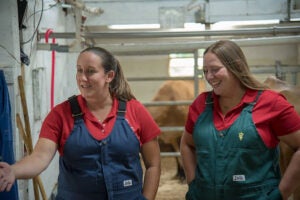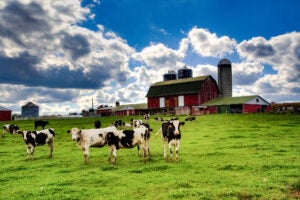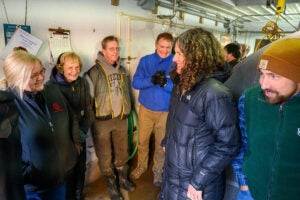A dairy farm takes many hands to run: milkers in the parlor, herdsmen checking on individual cows, breeders, veterinarians, nutritionists, human resources, accounting, technology experts to keep the tech going, and so many more.
But what all farms need is a few trusted, skilled managers. People who understand the “why” behind the protocols and who can lead a team.
Jay Canzonier, Extension Support Specialist with Cornell University’s Agriculture Workforce Development program, is leading the way promoting and facilitating a Dairy Specialist Apprenticeship program that aims to develop dairy farm workers into managers. Canzonier finds support in two New York milk cooperatives, Cayuga Marketing and Upstate Niagara, which have recognized the value in this model and have partnered with Cornell on this program to grow talent on farms and provide a sustainable succession plan for future farm leaders. Both cooperatives have member farms in the process of facilitating apprenticeship opportunities for employees.
After a long time of preparing, vetting professionals, and talking to producers and milk cooperatives, Cazonier’s team is promoting the Dairy Specialist Apprenticeship program with intentions on enrolling a cohort in spring of 2024. They know that this could be a key tool in keeping New York among the top dairy producing states. (According to U.S. Department of Agriculture information, New York is the third largest in the U.S., behind California and Wisconsin.)

The apprenticeship program benefits both the employer and the employee, and it is an investment by both parties. For employers, it allows them to develop talent from within their business, while still keeping the employee working on the farm throughout the learning experience. For the employees, the Dairy Specialist Apprenticeship Program is an opportunity for career growth without leaving the workplace and incurring student debt — that’s a big deal!
Because the apprenticeship is registered with the NYS Department of Labor, funding is available to offset training costs, and employers can take advantage of the Empire State Apprenticeship Tax Credit as an incentive to participate in the program. This is a win-win-win for the employer, employee, and the dairy industry.
The apprenticeship program takes about three years to complete — consisting of 6,000 hours of on-the-job training under the supervision of a qualified mentor and 432 hours of related instruction. The related instruction gives the apprentice the ability to understand the science and technology that keeps the dairy industry moving forward, while also teaching them the “why” behind the “way” things are done on the farm. Upon graduation, the apprentice is awarded a certificate of completion from NYS Department of Labor, a nationally recognized credential — this program is legit.
You may wonder, “What’s the point? I can train my own employees.”
Sure you can, and perhaps you’ve had a few success stories of employees you’ve had on the farm since the day they graduated high school. What the apprenticeship program offers is a networking opportunity for the apprentice, plus education that will allow them to bring in fresh ideas and perspectives to the dairy. These apprentices are gaining the ability to participate in the bigger conversations.
Canzonier says that the perfect person for the apprenticeship program is “someone with the capacity to grow, who has an interest in career development and a passion for the dairy industry.” The perfect candidate might be the worker — young or old — who shows up early, and always asks if there’s anything else to be done before they leave.

Much like achieving a college degree in dairy science, there’s a general curriculum. Farm safety, animal handling, and equipment operation, before the topics get more advanced like breeding, technology use, nutrition, genetics, and even some multicultural learning. Within the 432 hours of related instruction required, the apprentice can focus on their particular area of interest within the dairy by utilizing an array of approved courses facilitated by local universities. Many of these training sessions will be in person or a virtual classroom setting facilitated by experts that Canzonier and his team vet out for the program. Local events put on by county extension also count towards the 432 hours, such as skid steer safety or a day long hoof trimming course – both of which were offered by Cornell Cooperative Extension recently in my own county.
When asked why a young person looking for a career would choose to partake in the dairy apprenticeship program rather than going to lineman school, or perhaps a welding trade school, the answer was quick and clear: the lifestyle.
“All the trades have a defined pathway,” Canzonier said. “Sign up today, in three years you’ll have a full wallet and a new pickup.” The dairy industry offers a lifestyle that other trades cannot, and that’s something that piques a lot of interest, despite the fact that the money won’t come quite as quickly. Canzonier said that “the Dairy Specialist Apprenticeship is a pathway to the dairy farming lifestyle.”
Canzonier said many industries with apprenticeship programs use them as entry- level positions, but that is not at all his goal. This program will take passionate employees and help them turn their job into their career.
Working with animals and a hard-working team to produce a nutritious product is something to take pride in. Feeling like your work is meaningful is important to many people, this apprenticeship program isn’t here to quickly train and churn out employees, it’s here to develop the dairy workforce as a whole.
To be completely candid — there are increasingly fewer people seeking agricultural careers. Programs like this are what we need to be able to bring people into agriculture and to keep people in it.

Because the ideal candidate that Canzonier laid out is someone already on the farm, I asked what about the young kids? The seniors who think that college isn’t for them, but they need some more education to be able to make it in a career.
Canzonier agrees that this is the market of workers we need to pay attention to, and it’s up to teachers and farmers to identify these kids and make them aware of the career options in agriculture and how they could benefit from the apprenticeship program. Canzonier is working hard with his team to recruit the first class of apprentices, but knows that the success stories of his first classes will aid in keeping the program sustainable.
At the end of the day, Canzonier and his team feel that this program will prove beneficial in cultivating the next generation of managers. Canzonier, who operated a vegetable farm before taking on his role at Cornell Ag Workforce Development, says he wishes he could have gone through a program like this himself. Having the education coupled with the on the job training is the key to making this program successful.
To learn more about the dairy specialist apprenticeship program, check out the Cornell Agricultural Workforce Development’s website, where you can find more information, and more importantly – how to enroll as an apprentice!
Elizabeth Maslyn is a born-and-raised dairy farmer from Upstate New York. Her passion for agriculture has driven her to share the stories of farmers with all consumers, and promote agriculture in everything she does. She works hard to increase food literacy in her community, and wants to share the stories of her local farmers.



